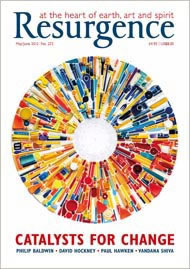A few years ago the American folk singer John Mellencamp released an album entitled Life, Death, Love and Freedom. Its closing track is called A Brand New Song. Couched in the traditions of an American folk sensibility, the piece resounds with a sense of life’s transience; of the gathering of insight and of the evolving realisation that one knows very little at all.
For me, there then followed an enjoyable little moment in which I made a connection between this song and Reveries of the Solitary Walker. Indeed, the definite article of the book’s title lends Rousseau’s experience, and recording of it, a symbolic, iconic power. Reveries encapsulates the quiet joy of walking. The book comprises ‘recollections’ of 10 walks, which are essentially wanderings around Rousseau’s thoughts. These walks helped to refine his thinking, and often took him away from the ‘conscious’ forces of Paris and out towards the ‘unconscious’ powers of the country.
Reveries was written in the last two years of his life, a point at which he recalled the rejection of his work by so many. In his life Rousseau had committed himself to exploring the relationship between the individual’s freedom and the demands of the state, and in Reveries he explains how he feels misunderstood, living as something of a pariah. It’s a state in which he perhaps belonged all his life, and in the Third Walk he writes: “I learned from early experience that I was not made for this world, and that in it I would never attain the state to which my heart aspired.” Maybe Rousseau can be considered to be a trickster, and this would certainly place him within a lineage that would subsequently include Henry David Thoreau (see Green Classics, page 40), Vincent Van Gogh and Jack Kerouac. A deep flow of thought to enjoy here.
This book is a manifesto of hope and encourages us to keep our thinking alert as we seek to step outside of the demands and tangles prompted by the needs of the day. Indeed, Rousseau, who was born 300 years ago this year, makes a comment as true of his moment in time as it is for many of us. In the Second Walk we read: “These hours of solitude and meditation are the only ones in the day when I am completely myself and my own master, with nothing to distract or hinder me, the only ones when I can truly say that I am what nature meant me to be.”
In Reveries there is the sense that we’re encountering a man for whom the aggression of the world is too much to bear any longer. In 1762 Rousseau had published Emile, in which he considered the education of children and proposed that it was possible to raise young people without encouraging them to assume a domineering attitude. In turn, this sense of nurturing, and particularly of growth (which is, of course, a key concern of education), finds expression in Rousseau’s Seventh Walk, when he connects inner wellbeing with the natural world: “Plants seem to have been scattered profusely over the face of the earth like the stars in heaven, so that the lure of pleasure and curiosity should lead men to study nature.”
Rousseau’s little book speaks loudly about wellbeing, reminding us of the need to unplug, to disconnect, to get ‘offline’ and to get real. Jean-Jacques wants us to wander and wonder.
In his essay Walking, written almost a century later, Henry David Thoreau brings us full circle to Reveries and to the idea of sauntering to mean being without a home. And yet, there is a sense that home is everywhere you travel to, within and without.







